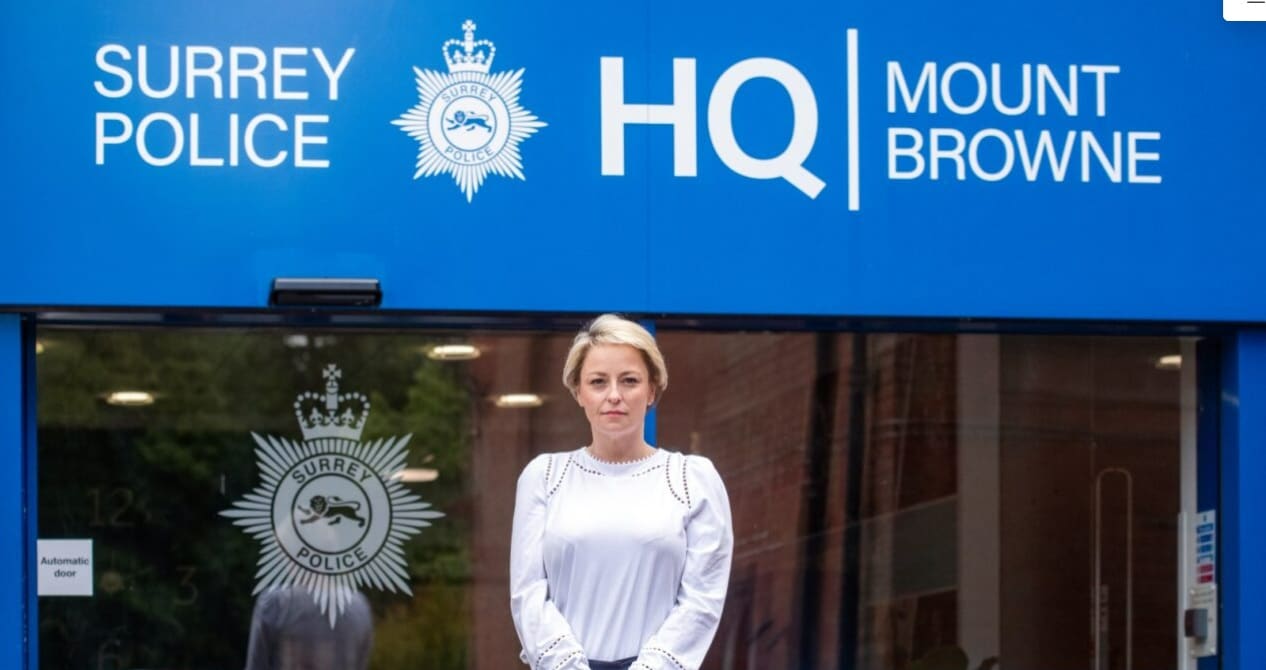Introduction to police misconduct proceedings
Pursuant to the Police Reform Act 2002, the Police and Crime Commissioner has a key role to play in the monitoring and scrutinising the way in which Surrey Police deals with dissatisfaction, complaints, and police misconduct. In their role, the Commissioner holds the Chief Constable to account for the performance of the Force including the standards of professional behaviour expected of its officers and staff.
Police officers in particular exercise significant powers. The police complaints and disciplinary systems are a key part of the accountability framework for the use of these powers and for maintaining confidence in policing, upholding high standards and protecting the public. The systems facilitate the public, and those serving within the police, to raise concerns about the behaviour of an individual serving with the police. The systems are governed by different pieces of legislation, and this dictates how a particular matter is handled. This includes differences between the processes involved for police officers and members of police staff.
Police complaints from members of the public, recordable conduct matters and death or serious injury (DSI) matters are handled under the Police Reform Act 2002 and the Police (Complaints and Misconduct) Regulations 2020 (the “Complaints Regulations”), whereas internal conduct matters are currently handled under the Police (Conduct) Regulations 2020 as amended by The Police (Conduct) (Amendment) Regulations 2024 (the “Conduct Regulations”). Whilst there are similarities between the systems, there are some distinct differences in how matters are handled.
Misconduct Proceedings are the formal process to hear cases, initiated when it is determined that an officer or member of police staff has a case to answer for misconduct or gross misconduct. For allegations referred to misconduct proceedings, those proceedings are always held under the Conduct Regulations or associated police staff misconduct procedures, regardless of what legislation the matter was investigated under. This means irrespective of whether the allegation was raised through a public complaint, internal conduct matter or recordable conduct matter, if the allegation is investigated and determined that it should be referred to misconduct proceedings, all those which are referred are handled under the same regulations at the misconduct proceedings stage.
Related information:
What is defined as misconduct?
Misconduct is generally defined as unacceptable or improper behaviour. The Police (Conduct) Regulations 2020 further define misconduct as ‘a breach of the Standards of Professional Behaviour that is so serious as to justify disciplinary action’.
There are two types of ‘misconduct’:
- Misconduct: A breach of the Standards of Professional Behaviour that is so serious as to justify disciplinary action.
- Gross misconduct: A breach of the Standards of Professional Behaviour that is so serious as to justify dismissal.
What are the Standards of Professional Behaviour?
The Police (Conduct) Regulations 2020 set out the ten standards of professional behaviour that police officers are expected to follow in the way they conduct themselves. The relevant behaviour under which allegations against an officer can be made are listed in the table below and the definitions of their meaning included:
- Honesty and Integrity: Police officers are honest, act with integrity and do not compromise or abuse their position.
- Authority, Respect and Courtesy: Police officers act with self-control and tolerance, treating members of the public and colleagues with respect and courtesy.Police officers do not abuse their powers or authority and respect the rights of all individuals.
- Equality and Diversity: Police officers act with fairness and impartiality. They do not discriminate unlawfully or unfairly.
- Use of Force: Police officers only use force to the extent that it is necessary, proportionate and reasonable in all the circumstances.
- Orders and Instructions: Police officers only give and carry out lawful orders and instructions.Police officers abide by police regulations, force policies and lawful orders.
- Duties and Responsibilities: Police officers are diligent in the exercise of their duties and responsibilities.Police officers have a responsibility to give appropriate cooperation during investigations, inquiries, and formal proceedings, participating openly and professionally in line with the expectations of a police officer when identified as a witness.
- Confidentiality: Police officers treat information with respect and access or disclose it only in the proper course of police duties.
- Fitness for Duty: Police officers when on duty or presenting themselves for duty are fit to carry out their responsibilities.
- Discreditable Conduct: Police officers behave in a manner which does not discredit the police service or undermine public confidence in it, whether on or off duty.Police officers report any action taken against them for a criminal offence, any conditions imposed on them by a court or the receipt of any penalty notice.
- Challenging and Reporting Improper Conduct: Police officers report, challenge or take action against the conduct of colleagues which has fallen below the Standards of Professional Behaviour.
Types of misconduct proceeding
The type of proceeding held (meeting, hearing or accelerated hearing) will depend on the severity of the allegation for which it has been determined that an officer has a case to answer. Regulation 41(15) of the Conduct Regulations provides that the person(s) conducting the misconduct proceedings must review the facts of the case and decide whether the conduct of the officer concerned amounts— in the case of a misconduct meeting, to misconduct or not; or in the case of a misconduct hearing, to misconduct, gross misconduct or neither.
Misconduct Meetings:
Where the allegations against the officer amount to misconduct, a Misconduct Meeting will be arranged to determine whether the conduct of the officer amounts to misconduct or not and whether disciplinary action should be imposed. These meetings are arranged by the Force, held in private and are led by a senior police officer, usually a Chief Inspector or a Superintendent, alongside a Federation representative if the officer/staff has one.
Gross Misconduct Hearings for police officers & special constables
Where there is a case to answer in respect of gross misconduct (or where, at the time of the severity assessment, the individual had a final written warning in place or had been reduced in rank within the previous 2 years), a Gross Misconduct Hearing will be arranged by the Force.
As of 07 May 2024, hearings in relation to police officers must be chaired by a Chief Constable (or delegated Assistant Chief Constable) alongside two Independent Panel Members (IPMs) and a Legally Qualified Person (formally a Legally Qualified Chair and a Legally Qualified Advisor). The latter is not party to any decision making but available to provide advice on legal and procedural issues to the panel. These hearings are usually held in public, although in exceptional circumstances the Chair may determine to only hold part of the hearing in public and the whole hearing in private. If this is the case, then the Chair must provide justification for hearings held in private as well as justification for findings of gross misconduct not leading to dismissal.
The Office of the Police & Crime Commissioner for Surrey is responsible for the appointment and training of LQCs/LQA/LQPs and IPMs. Surrey OPCC maintains a list of LQCs/LQA/LQPs available to sit on gross misconduct hearings. These appointments have been made on a regional basis in partnership with OPCCs from Kent, Hampshire and Isle of Wight, Sussex and Thames Valley. The LQPs for all gross misconduct hearings in Surrey are selected from this list by using a cab-rank system to ensure fairness.
- Find out more about how we select, recruit and manage LQCs/LQAs/LQPs here
- View or Legally Qualified Chairs Handbook
Booking to attend a future police officer Gross Misconduct Hearing:
Details of future police officer Gross Misconduct Hearings are published with at least five days’ notice on the Surrey Police website:
They are usually held at the Surrey Police Headquarters in Guildford. Places are limited and will need to be booked in advance, preferably at least 48 hours before the hearing.
- To comply with the rules of attendance, observers are required to provide their name, email address and contact telephone number.
- To book a place please contact Surrey Police.
Gross Misconduct Hearings for police staff:
For police staff, their Gross Misconduct Hearings are led by a senior police officer, usually a Chief Inspector or a Superintendent alongside a Unison representative if the member of staff has one. These hearings are not held in public.
Accelerated Misconduct Hearing:
An accelerated hearing is a fast-tracked misconduct hearing held when there is sufficient evidence (on the balance of probabilities) that the conduct of the individual concerned constitutes gross misconduct and that it is in the public interest that the individual ceases to be a member of the police force without delay. This type of hearing is not held in public.
Misconduct proceeding outcomes & what they mean
Police officers exercise significant powers. If public confidence in the police service is to be maintained, outcomes should be sufficient to demonstrate individual accountability for any abuse or misuse of police powers. These outcomes must also be imposed fairly and proportionately and must be used to achieve organisational justice.
The power to determine outcome arises after the person(s) conducting the misconduct proceedings have reviewed and determined the facts, established which, if any, Standards of Professional Behaviour have been breached, determined whether the conduct found proven against the officer amounts to misconduct, gross misconduct or neither.
The Home Office Guidance allows persons considering more than one allegation against the same officer at a misconduct hearing to take the allegations together. They can treat them as a single allegation for the purposes of making an assessment, a finding, a determination, or a decision in connection with conduct that is the subject matter of an allegation.
Not all behaviour which falls short of the standards of professional behaviour engages the discipline system and therefore, not all allegations are referred to misconduct proceedings.
Other processes, such as the Reflective Practice Review Process (RPRP) (a solution through learning which gives officers a chance to learn from and reflect on what could have been done better) may be initiated when such behaviour is identified that does not warrant disciplinary action and other processes, such as the Unsatisfactory Performance Procedures (UPP), exist where an individual’s performance is considered unsatisfactory.
Please see below examples of available outcomes:
Available outcomes from a Misconduct Meeting:
- Written warning
- Final written warning
Available outcomes from a Gross Misconduct Hearing:
- Written warning
- Final written warning
- Reduction in rank
- Dismissal without notice
Outcome definitions:
- Written warning: A written warning details the allegations against the officer and warns against similar future conduct. They remain in force for a period of 18 months.
- Final written warning: A final written warning details the allegations against the officer and warns of the repercussions of not changing their conduct. They remain live for 2 years although this can be extended up to 5 years at misconduct hearings.
- Reduction in rank: The officer is demoted one or more ranks. This outcome is appropriate if a tougher outcome than a final written warning is warranted but the threshold for dismissal has not me reached.
- Dismissed without notice: The allegations against the officer have been proven and are so egregious as to warrant dismissal. The ex-officer may also be placed on the police barred list preventing them from rejoining the police in the future.
- Resigned. Would have been dismissed: The allegations against the ex-officer have been proven and are so egregious as to warrant dismissal. The ex-officer may also be placed on the police barred list preventing them from rejoining the police in the future.
- Matters not proven: The allegations against the officer have not been proven and so there is no sanction.
Police Appeals Tribunals
Police Appeals Tribunals (PATs) hear appeals against the findings of gross misconduct hearings brought by police officers or special constables. PATs are currently governed by the Police Appeals Tribunal Rules 2020.
Members of the public can attend Appeal hearings as observers but are not allowed to participate in proceedings. The Office of the Police & Crime Commissioner for Surrey is responsible for appointing the PAT chair to conduct the proceedings.
Appeals Tribunals are held at Surrey Police Headquarters in Guildford or other location as determined by the Police and Crime Commissioner with information about how and when they are held made public here.
Places are limited and will need to be booked in advance, preferably at least 48 hours before the hearing. To comply with the rules of attendance, observers are required to provide their name, email address and contact telephone number. To book a place please contact Surrey Police.
Related information:
- Police Appeals Tribunals Rules 2020
- Police Appeals Tribunal Chair Terms and Conditions – March 2023
- Police Appeals Tribunal Chair Fees 2023
Helping build public trust and confidence in policing
National Police Chiefs’ Council (NPCC) Historic Data Wash of Police Workforce Records against the Police National Database 2023:
Since the appalling revelations about some officers serving in the Metropolitan Police, all police forces across the country, including Surrey Police, were required by government to undertake a historic ‘data wash’. This involved conducting checks and research of the Police National Database (PND) to identify any previously unknown information about staff and officers which could impact on their suitability for policing. The findings of this report show that only three individuals in Surrey Police required further vetting checks as a result.
Launch of the Police Anti-Corruption and Abuse Reporting Service:
Surrey Police joined other UK forces to launch the Police Anti-Corruption and Abuse Reporting Service, run by the independent charity Crimestoppers, to give the public an anonymous and confidential route to report concerns about criminal behaviour by individuals in policing. This will bolster the Force’s capability to take action against those who are not fit to serve, a commitment made by Chief Constable Tim De Meyer and the PCC.
Call the Police Anti-Corruption and Abuse Reporting Service on
0800 085 0000 or use the online form here.
Latest News
Commissioner and Deputy share winning artwork from their annual Christmas card competition

Lisa Townsend and Ellie Vesey-Thompson have revealed the winner of their annual Christmas card competition.
New Surrey Police base set for Redhill next year, Commissioner announces

Commissioner Lisa Townsend has hailed a "bright future for policing" after the purchase of a site in Redhill.
Would you pay a little extra council tax to support the fight against crime? Have your say on police funding!

The Commissioner is asking Surrey residents whether they'd be prepared to pay around £1 extra a month in council tax.